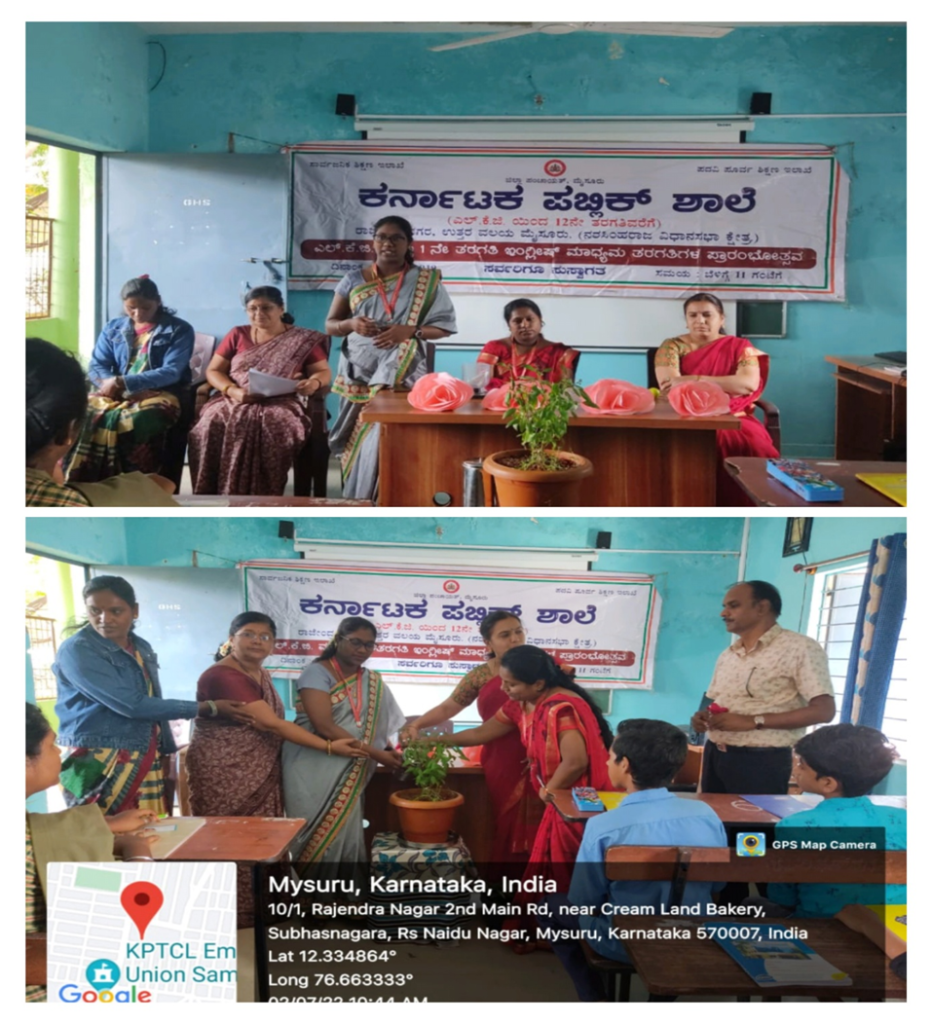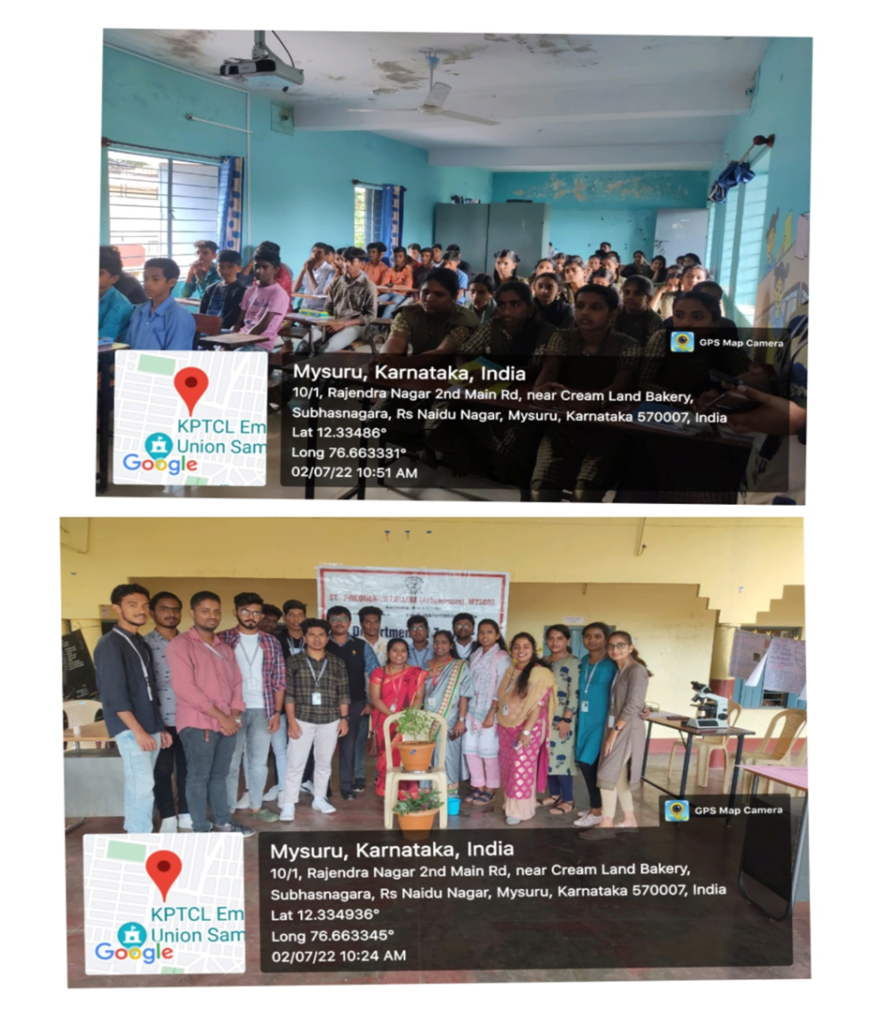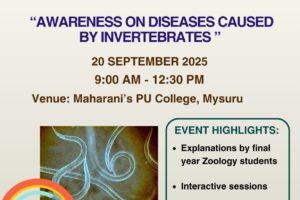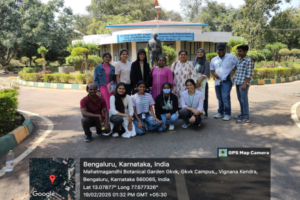
Report on extension activity
Title-“Worm infestation, causes, symptoms and preventive measures”
(Visit to Karnataka Public School, Rajendra Nagar, Mysuru)
Report on extension activity
Title-“Worm infestation, causes, symptoms and preventive measures”

(Visit to Karnataka Public School, Rajendra Nagar, Mysuru)
Infestation is the state of being invaded by pest or parasite. So the worm infestation is referred to as an infestation of the host especially human and animals by helminth. Morbidity due to intestinal worm infestation is a global health problem affecting nearly two billion people in more than 100 countries. High prevalence of intestinal worm infestation is an indicator of poor living conditions and low standard of sanitization in a society.
The Department of Zoology, St. Philomena’s autonomous college emphasizes on all round development by organizing various extension activity to inculcate a sense of social responsibility, value of education, awareness and humanitarian values amongst the students by connecting them to the neighboring community. Department of Zoology takes a lot of initiatives to sensitize them towards the awareness of marginalized, thereby making them aware of their responsibility towards the society at large.
Students of interest were taken to Karnataka Public School, Rajendra Nagar, Mysuru. As a Departmental activity to give a awareness on parasitic worm diseases and also students were explained about its morphology, lifecycle, causes, symptoms and preventive measures on 02/07/2022. Students had prepared charts which are relevant to the topic which they had to explain and also parasitic worm slides, stuffed organisms in wax model, protozoan slides and types of microscopes were taken to the school to enlighten Karnataka Public school children more about the topic.
The extension activity was divided into two sessions.
The first half of the session started with inauguration of the program at 10.00 AM followed by Welcome speech by Mrs. Tara Veerendra Hegde, Science teacher of the Karnataka public school, Presidential key note address by Dr. Shwetha, Vice Principal of the Karnataka Public School and staff members of other subjects were also present in this session. The Brief introduction about actual core of the program was given by Mrs. Sangeetha M D.
After that students and staff members of the school were taken to the place at 10.30 am where charts were displayed and microscopes were arranged. Staff divided the children in to five groups and allowed them to observe different types of parasitic worm slides under the microscopes, meanwhile our students started explaining the concepts about parasitic worms like liver fluke, Tapeworm, Pinworm, Hookworm, Round worm, Filarial worm etc.
In association with Karnataka public school, their children and staff, our students had participated in this initiative with enthusiasm and had presented their charts and explained about parasitic worms which can cause diseases.
The session was informative and useful to the students, following this there was a wonderful interactive session where the children interacted with our students, clarifying their doubts and asking interesting questions.
The second half of the session was related to Blood typing and Rh factor. Instructions were given by Mrs. Mary Sofia at 11.30AM followed by demonstration.
Blood typing is a test that determines a person’s blood type. The test is essential if you need a blood transfusion or planning to donate blood.
Not all blood types are compatible, so it’s important to know your blood group. Receiving blood that incompatible with your blood type could trigger a dangerous immune response.
Your blood type is determined by what kind of antigens your red blood cells have on the surface.
Antigens are substances that help your body differentiate between its own cells and foreign, potentially dangerous ones. If your body thinks a cell is foreign, it will set out to destroy it.
The ABO blood typing system groups your blood into one of four categories:
Type A has the A antigen.
Type AB has both A and B antigens.
Type B has the B antigen.
Type O has neither A nor B antigens.
If blood with antigens that you don’t have enters your system, your body will create antibodies against it. However, some people can still safely receive blood that isnt their blood type.
As long as the blood they receive doesn’t have any antigens that mark it as foreign, their bodies won’t attack it.
This activity helps children to understand the concept of identifying the different blood groups. Around 33 children were gathered along with their teachers. All of them enjoyed the various aspects which we presented. The stage was filled with excitement as children indulged in activity.
Department of Zoology had organized fruitful awareness programme for all the students to inculcate knowledge and spread awareness about Helminthes diseases, blood transfusion, and healthy lifestyle. Through this activity the child will be able to develop and acquire the knowledge, understanding and differences between microscopes.
During the programme students were explained about various aspects and we have given a little boost of encouragement to kick start their future academic plan. This activity helps students to develop depth learning skills, creativity , sharpen the skills and also helps to mature the child’s self esteem and self confidence their participation in the Activity. The successful program ended around 12.30PM with vote of thanks. Lunch was arranged by the Karnataka Public school.




